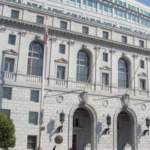Berkeley Law professors are prolific, insightful scholars with broad and significant influence felt well beyond the school’s walls through their research, legal advocacy, policymaking and commentary.
New Research

Albiston Cited in Supreme Court Opinion
A 2007 UCLA Law Review article by Professor Catherine Albiston J.D. ’93 Ph.D. ’01 was cited in a recent U.S. Supreme Court opinion. In a 7-2 decision in Lackey v. Stinnie, the Court held that plaintiffs who won preliminary injunctive relief in a civil rights enforcement action under Section 1983 that later became moot cannot obtain attorney fees as prevailing parties.
Should the Stored Communications Act Trump California Law?
UC Berkeley Law Dean Erwin Chemerinsky, Professor Rebecca Wexler, and Criminal Law & Justice Center Executive Director Chesa Boudin recently filed an amicus curiae brief in a case now before the California Supreme Court that turns on whether a federal law prevents criminal defendants from subpoenaing evidence they need to defend themselves.
Center Hosts Powerhouse Conference
UC Berkeley Law’s Center for Private Law Theory recently hosted the North American Workshop on Private Law Theory for the first time, welcoming a stellar group of scholars from around the world to discuss research works in progress. The workshop’s 11th annual meeting included the revival of its John G. Fleming Award, given to University of Toronto Professor Ernest Weinrib for his tort law contributions.
Stellar ESG Scholarship
As part of its annual Berkeley Forum for Corporate Governance, the Berkeley Center for Law and Business hosted an academic symposium focused on ESG — which stands for Environmental, Social, and Governance — topics in business law. In partnership with the European Corporate Governance Institute, the symposium included a Best Paper Award, which includes a $10,000 prize. Three winners were selected from more than 70 articles submitted by scholars from all over the world.
Scrutinizing Stipulated Protective Orders
Stipulated protective orders, or SPOs, seal discovery information in a civil lawsuit from the public and have become increasingly common in recent decades. In a new paper in the Duke Law Journal using state-of-the-art machine learning techniques, Professor Jonah B. Gelbach and a team of co-authors show that not only are these orders frequently granted, they’re rarely subjected to the type of judicial scrutiny Federal Rule of Civil Procedure 26(c)trequires — hiding potentially deadly defects and abuse from the public.









